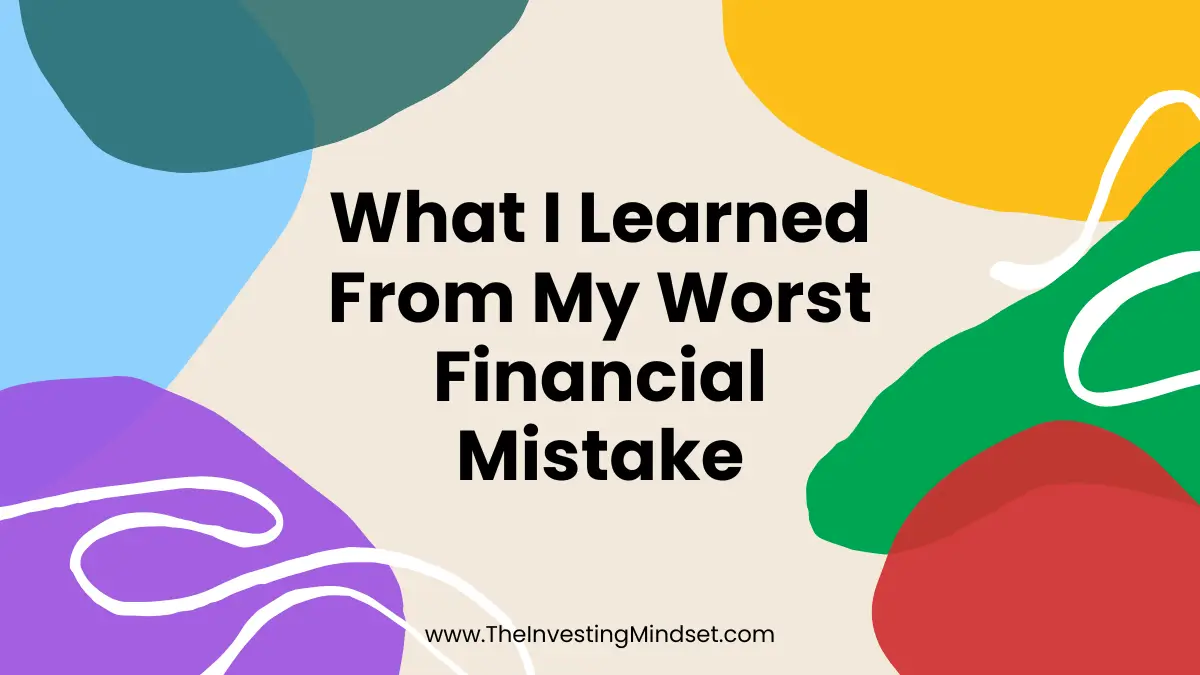"Failure is a great teacher. When you make mistakes and learn from them, you have valuable experiences to share."
Steve Harvey
What do you do when you make financial mistakes?
Do you take responsibility for your errors and move on?
Or do you make excuses, complain, and never learn from your mistakes?
Marcus Cicero, the great Roman orator, said…“Any man can make mistakes, but only an idiot persists in his errors.”
I have been making financial mistakes all my life. I have made some mistakes that are of little consequence. I have also made big money mistakes that I wish I had not made.
The Lessons of Making Financial Mistakes
Two things happen when you make big, whopping financial mistakes like the one I am about to share. The first thing you feel is the pain that comes with it. Yes! You feel pain.
The second consequence of making financial mistakes is learning something that will make you wiser. Or if you choose not to learn from your mistake, you keep repeating the same mistakes.
Business Mistake Early On
I made one of the worst financial mistakes early in my business career. I want to share my story.
Shortly after I graduated from Med school…I decided to become an entrepreneur because I realized early enough in my teen years that the fastest way to financial freedom was to be a successful investor or business owner.
Yes, it’s true. In his book, The Millionaire Next Door, Dr. Thomas Stanley found that most millionaires were business owners or successful investors. A few professionals become wealthy if they own a thriving professional practice or have invested their income wisely.
I quickly set out on a plan to start my first business venture: a resume writing and project writing business that served science and medical students, resident doctors, and postgrad students at my medical school.
I was so excited about becoming a millionaire at an early age that I skipped crucial steps to starting a business -doing market research and business analysis to check if my business would be viable.
“What could go wrong? This business is a no-brainer,” I told myself, standing in the mirror every morning. I had some fantastic dreams about myself …traveling the world…living the life of a millionaire…I had my head in the sky.
A Flawed Funding Strategy
I decided to fund the business with my first three months’ salary because I did not want anyone to talk me out of starting my first business and because I earned extra income from doing a weekend side job.
My junior brother wanted to be my partner but had no funds to invest. As his equity capital, he brought a photocopier that he got as a gift from my cousin. I agreed to bring him on board as a partner.
The decision to accept my brother’s “equity”= (a broken photocopier) proved to be an expensive mistake that was the doom of the business from the get-go.
Why? The photocopier that was supposed to be my business’s cash cow was a liability.
The photocopier was obsolete and not a popular brand with readily available parts and service technicians who could fix the machine if there was a problem in my area.
Instead of earning income, I spent my hard-earned money fixing this machine. To make matters worse, I advertised and marketed the business to many of my friends on campus, but I could not fulfill my orders. As a last resort, I turned over my customers to my competitors, and my losses piled on and on until I pulled the plug on the business.
By the time I had closed the business, I had lost over $900. Losing $900 was financially depressing because my monthly net income was $365.

Moving On and Learning From Mistakes
My business loss affected my financial well-being because I had no money to buy furniture for my flat. As a result, I slept on the carpet in the bachelor’s suite I rented. What may make the experience more depressing was how I felt when I visited my colleagues living in tastefully furnished, air-conditioned rooms.
My saving grace from financial ruin was the extra income I earned from my weekend job. I felt ashamed of myself and beat myself up in the days after my first business collapsed. It took almost two years to overcome the loss, but I dared to move on. I have moved on from my first business failure to launch other successful ventures.
How was I able to move on from my past failure? I was able to bounce back from my mistake by doing two things. First, I never took the loss of my business personally. I learned from my mistakes and committed to doing better in my next venture.
Rich Schefren, the founder of Strategic Profits, said,
Resilience – the ability to bounce back quickly from a setback and put disappointments behind you – is critical for business success and in most areas of life.
Building Wealth Bores Down to Getting Results
The moral of Schefren’s statement is that you don’t have to allow making mistakes to stop you from taking risk in business
Another important thing I learned from the mistakes that led to the failure of my first business was that it allowed me to develop the right attitude and character to become a successful entrepreneur.
Why? Because I found that building wealth bores down to getting results and not making excuses. If your business is successful, it will show in your profits. If your business fails, it will show in the losses you pile up.
It takes a particular character and mindset to succeed in business, industry, or profession…Unless you have the traits for success, you are going to lose.
I learned this harsh reality when I started in the business after I failed in my first venture. What changed things for me was how I responded to my mistake. I chose to face the truth and ask myself these questions:
Do I want to make excuses for my mistakes? or Do I want to learn the lessons from my mistakes and move on?
I decided to take responsibility for my mistakes…and move on.
How about you, my friend? Are you willing to learn from your mistakes and move on to other things? Or you want to keep on whining and making excuses for why you failed.
Taking responsibility for your mistakes and moving on may sound easier said than done. It is the right thing to do because a gem of learning comes with every mistake you make.
W Clement Stone once said,
“Every great man, every successful man, no matter what the field of endeavor, has known the magic that lies in these words: every adversity has the seed of an equivalent or greater benefit.”
The moral of Clement Stone is that making mistakes is not bad. They are great opportunities to make you a better person.
In conclusion, you should not fear making “ financial mistakes” because mistakes result from judgment errors. You should see them in a neutral light unless you think about them with emotional attachment. So, if you say you’ve made a mistake, it doesn’t mean you don’t or feel bad. Instead, see the stakes as opportunities to learn from and improve next time.



